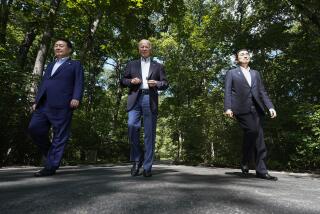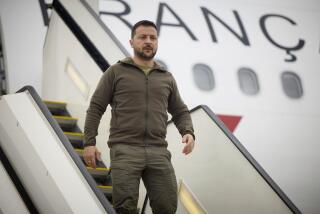Summit Nations Approve Sweeping Tariff Reductions : Trade: U.S., Canada, Japan and European Community move to revitalize stalled international talks. But major issues remain that could scuttle treaty.
TOKYO — The United States, Canada, Japan and the European Community, moving to revitalize stalled international trade talks, today reached a major agreement to bring about what a senior Administration official called the “largest reduction in tariffs in the history of trade negotiations.”
The agreement, which President Clinton and U.S. Trade Representative Mickey Kantor outlined to the opening session of the international economic summit here this afternoon, would eliminate all tariffs in eight specific economic sectors--pharmaceuticals, construction equipment, medical equipment, steel, farm equipment, furniture, distilled spirits and beer, according to a senior official of the trade representative’s office.
It would also commit the international community to reductions of 30% to 50% in a series of other sectors covering billions of dollars in international trade.
U.S. officials portrayed the agreement, reached in talks among the leading industrial nations meeting here, as a major achievement of the summit, one that they plan to tout as a major example of American leadership.
Leon Brittan, the European Community’s trade chief, said the arrangement marked a breakthrough in the Uruguay Round of the General Agreement on Tariffs and Trade, the ambitious effort by 114 nations to revamp the world trading system.
Nonetheless, the agreement leaves unsettled a series of major trade issues that could still derail a final treaty on reducing trade barriers, which the United States and its trading partners have been trying to complete by the end of this year.
Today’s agreement appeared to be in line with a prediction late last week by a senior Administration official: “If we get a market access agreement in Tokyo it will be a relatively modest one. If we don’t, our work is going to be that much harder. The concern is that we start pulling into protectionism, which would just be devastating.”
In particular, the agreement does not bridge the wide gap between Europe and the United States on agricultural issues. And it leaves only partially resolved the major U.S. goal in the trade talks--expanded trade in services. The new agreement includes a commitment by all four parties to the talks to liberalize trade in services, but several hitches remain, particularly Japan’s restrictions on financial services. The agreement also fails to resolve the dispute between the United States and its trading partners over high U.S. tariffs on textiles. Other disagreements continue on telecommunications.
Talks on agricultural trade will continue in Geneva later this month, the official said.
As recently as last week, the GATT talks seemed fatally stalled.
But a final round of talks over the last several days revived hopes of an agreement, U.S. officials said.
“There was a realization that we weren’t going to make it, that the talks were going to fail,” the official said. After that, “people got their act together” and began making concessions.
The key concession came late Tuesday night when Japan offered to drop its insistence on high tariffs on liquor if other nations would make concessions in other areas. This morning, in response, Canada agreed to drop its insistence on beer tariffs, the official said, and an agreement was rapidly concluded.
Meanwhile, in bilateral U.S.-Japan trade talks, Tokyo has moved toward the American position, U.S. officials said Tuesday.
Officials declined to discuss details of the delicate trade negotiations, which resumed this morning. And they cautioned that an agreement, if one is reached, may not come before the G-7 meetings end Friday, the deadline that both governments had pledged to meet last spring.
But Clinton said in a joint press conference with Miyazawa after their hourlong meeting that some progress had been made. And, in a bid to facilitate further progress at a time of political turmoil in Japan, he asserted that the changes he seeks in U.S.-Japanese trade relations will yield practical benefits to ordinary people in both countries, not just the United States.
Clinton, while continuing to press Japan on trade, also gave new emphasis to security issues, declaring that the United States has no intention of abandoning its traditional role in the security concerns of Japan and all of Asia despite the end of the Cold War.
“The United States intends to maintain our forward military presence, our presence in Japan, our presence in Korea and our security agreements in this area,” Clinton said. “We intend to maintain a full engagement in this region.”
His emphasis on security was prompted in part by rising concern in Tokyo and other Asian capitals over the possibility that North Korea may be moving to become a nuclear power.
Miyazawa himself voiced that concern in his press conference with Clinton. While affirming that Japan has “no intention of producing nuclear weapons,” he said that such weapons in the hands of North Korea--if coupled with a capability to launch them--”would be a direct threat” to Japan.
“We’d be very concerned if we are to be exposed to that sort of threat,” he said.
Clinton arrived in Tokyo under unseasonably clear and sunny skies Tuesday afternoon, after a grueling overnight flight across the Pacific. David Gergen, his newly appointed counselor, described the President as “tired but upbeat” and convinced that his meetings with Japanese officials got off to a good start.
Gergen talked effusively about the President’s day and quoted him as saying, after the session with Miyazawa, that it “was terrific; covered the waterfront.”
The initiative for a new economic agreement with Japan was launched by Clinton last spring with a burst of unusually tough rhetoric, and there have been continuing negotiations, including an exchange of visits between Washington and Tokyo last month.
Last Friday, Gergen and Secretary of State Warren Christopher disclosed, Miyazawa sent a letter to Clinton. Gergen said that “the substance” and “the spirit of the letter” reflected “movement toward the American side.”
The President worked on a reply before leaving the United States, and by the time he arrived here, his letter was on the prime minister’s desk. Gergen declined to discuss its contents except to say that some things still need to be negotiated and that representatives of both sides will continue talking today.
But Treasury Secretary Lloyd Bentsen told reporters this morning that “there’s been some give on both sides” in the U.S.-Japanese trade negotiations.
With all of the summit nations in the economic doldrums and their leaders slumping badly in public opinion polls, U.S. officials here have been lowering expectations that this week’s G-7 meetings will produce any significant agreement. Instead, they have emphasized that Clinton will be taking the lead in what Christopher called “the three-legged stool” of relationships--economic, political and security.
Indeed, Christopher went so far Tuesday night as to urge reporters not to get “fixated” on the G-7 aspect of Clinton’s trip. Instead, he sought to focus attention on the importance of the President’s first trip abroad to Asia, saying it is a region of great economic and security interest to the United States.
“After all, Asia buys more from us than any other region in the world,” he said. “Our trading relationship is the strongest of any region in the world. It gives the President an opportunity to emphasize that we intend to remain a Pacific power; to emphasize that we will maintain our security relationships in the Pacific, and that we feel a responsibility to provide leadership in the Pacific. Our forward basing will continue in the Pacific.”
In addition to economic and general security matters, Christopher said, the G-7 summit will take up the need for additional humanitarian aid from Asia for war-ravaged Bosnia. Humanitarian aid is running low, he said, but the United States has committed more aid than any other country--more than $345 million since the war began there. He said he and Clinton will be urging the allies to be forthcoming with additional aid.
With a Japanese general election less than two weeks away, the President also met with a dozen of Japan’s opposition leaders at a reception at the U.S. ambassador’s residence, a session that some of the Japanese media considered to be an insult to Miyazawa.
In fact, such receptions for a broad array of Japanese leaders have long been part of presidential visits here. It is only because Miyazawa’s Liberal Democratic Party, which has ruled Japan without interruption since 1955, is now facing its first serious political challenge that this year’s meeting has become controversial.
The outgoing U.S. ambassador, Michael Armacost, who will soon be succeeded by former Vice President Walter Mondale, drew up the invitation list and the White House approved it. The guests included former Prime Minister Toshiki Kaifu and Tsutomu Hata, a defector from the Liberal Democrats who has set up a new opposition party.
More to Read
Sign up for Essential California
The most important California stories and recommendations in your inbox every morning.
You may occasionally receive promotional content from the Los Angeles Times.











